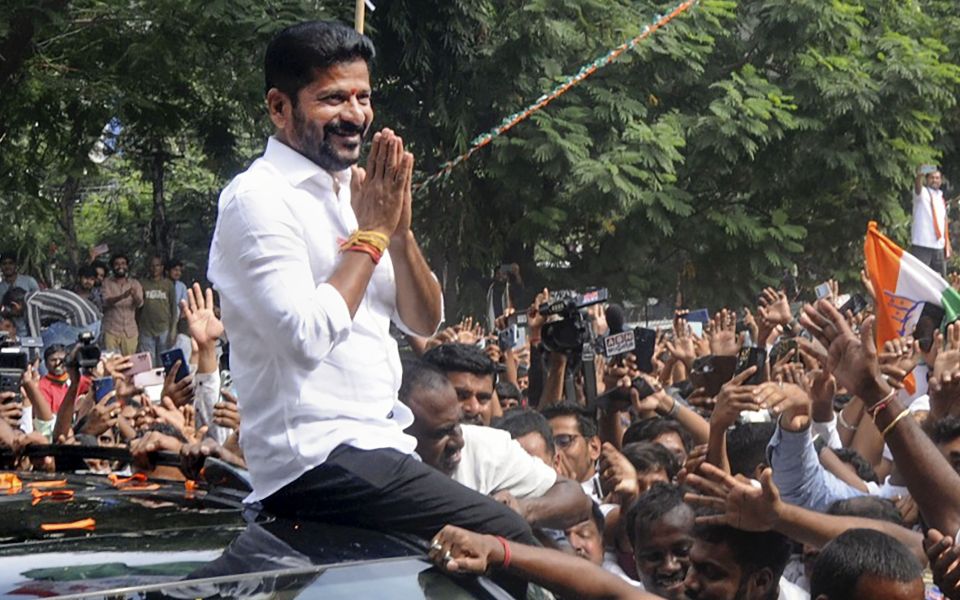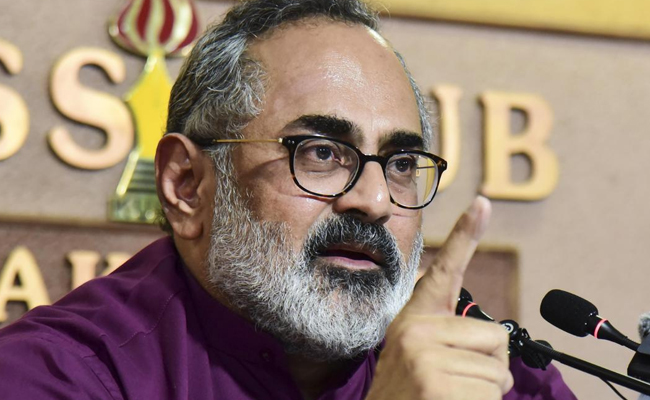Hyderabad, Dec 2: Anumula Revanth Reddy, whose political trajectory has surged from student activism with the ABVP to a brief period of incarceration amid allegations of bribery, now finds himself on the brink of a potential chief ministership.
The 56-year-old Congress leader is known among fellow politicians, partymen and people for his never-say-die attitude.
A fierce critic of BRS chief K Chandrasekhar Rao, Reddy, the Telangana Congress chief, is often the target of virulent political attacks by the BRS and the AIMIM.
The BRS leaders attack him for changing parties, with regard to the 2015 'cash for vote' case in which he was arrested and for allegedly being the "agent of" TDP chief N Chandrababu Naidu.
AIMIM president Asaduddin Owaisi targets him over his ABVP background.
Reddy, who was briefly in BRS (then TRS) was first elected to a political office in 2006 when he was successful in a Zilla Parishad election. He was elected as a Zilla Parishad Territorial Constituency (ZPTC) member then as an independent.
He was elected to the legislative council in undivided Andhra Pradesh in 2007 as an independent.
Reddy had joined the TDP and became a confidante of party chief and former chief minister Chandrababu Naidu.
Reddy, a graduate in arts, was elected to the Legislative Assembly on a TDP ticket in 2009 and later in 2014 when Telangana was carved out of Andhra Pradesh.
He faced the biggest challenge of his political life in 2015 when he was allegedly caught on camera trying to bribe a nominated MLA to vote in favour of the TDP in a legislative council election.
He was sent to a jail in Hyderabad but was released after he secured bail.
Revanth Reddy lost the 2018 Assembly poll to the BRS candidate and remained in political wilderness for a while.
He quit the TDP and joined the Congress in 2017-18 in the presence of party leader Rahul Gandhi in Delhi.
Reddy was elected to the Lok Sabha in the 2019 elections from Malkajgiri here, described as a 'mini-India' in view of the presence of people from all over the country in the constituency.
Reddy was appointed the PCC president in 2021 in spite of being a junior in the Congress. This has led to a heartburn among many seniors in the state Congress unit.
He had the unenviable task of reviving the fortunes of the Congress amid challenging circumstances and succeeded in bringing together the party leaders.
The ruling BRS was at the pinnacle of its power and glory after a resounding victory in the 2018 Assembly polls and 12 Congress MLAs joining the ruling party in 2019.
The Congress continued to face setbacks as the BJP scored major wins in the bypolls to two Assembly constituencies and the Greater Hyderabad Municipal Corporation (GHMC) election during 2020 and 2021 after Bandi Sanjay Kumar took over the reins of the BJP in Telangana.
Undaunted, Reddy continued to lead the party in the face of stiff challenges and the Congress in Telangana saw a change in its fortunes after the Karnataka elections in May this year.
After the momentum generated following the Karnataka win, the graph of Congress rose further in Telangana in view of a perception among people and political circles about an alleged tacit understanding between the BRS and the BJP, especially with regard to allegations against MLC and CM KCR's daughter Kavitha in the Delhi excise policy case.
Reddy, a football lover, who is considered to be close to Rahul Gandhi and Karnataka Deputy Chief Minister D K Shivakumar, could well become the chief minister in view of the Congress coming out on top in the Assembly polls.
Let the Truth be known. If you read VB and like VB, please be a VB Supporter and Help us deliver the Truth to one and all.
Judge cites denial of home to Muslim girl, opposition to Dalit women cooking mid-day meals
Hyderabad, February 23, 2026: Supreme Court judge Justice Ujjal Bhuyan has said that despite repeated affirmations of constitutional morality by courts, deep societal faultlines rooted in caste and religious discrimination continue to shape everyday realities in India.
Speaking at a seminar on “Constitutional Morality and the Role of District Judiciary” organised by the Telangana Judges Association and the Telangana State Judicial Academy in Hyderabad, Justice Bhuyan reflected on the gap between constitutional ideals and social practices.
He cited a recent instance involving his daughter’s friend, a PhD scholar at a private university in Noida, who was denied accommodation in South Delhi after her surname revealed her Muslim identity. According to Justice Bhuyan, the landlady bluntly informed her that no accommodation was available once her religious background became known.
In another example from Odisha, he referred to resistance by some parents to the government’s mid-day meal programme because the food was prepared by Dalit women employed as cooks. He noted that some parents had objected aggressively and refused to allow their children to consume meals cooked by members of the Scheduled Caste community.
Describing these incidents as “the tip of the iceberg,” Justice Bhuyan said they reveal how far society remains from the benchmark of constitutional morality even 75 years into the Republic. He observed that while the Constitution lays down standards of equality and dignity, the morality practised within homes and communities often diverges sharply from those values.
He emphasised that constitutional morality requires governance through the rule of law rather than the rule of popular opinion. Referring to the evolution of the doctrine through judicial decisions, he cited Naz Foundation v Union of India, in which the Delhi High Court read down Section 377 of the Indian Penal Code, holding that popular morality cannot restrict fundamental rights under Article 21. Though the judgment was later overturned in Suresh Kumar Koushal v Naz Foundation, the Supreme Court ultimately restored and expanded the principle in Navtej Singh Johar v Union of India, affirming that constitutional morality must prevail over majoritarian views.
“In our constitutional scheme, it is the constitutionality of the issue before the court that is relevant, not the dominant or popular view,” he said.
Justice Bhuyan also addressed the functioning of the district judiciary, underlining that trial courts are the first point of contact for most litigants and form the foundation of the justice delivery system. He stressed that due importance must be given to the recording of evidence and adjudication of bail matters.
Highlighting the role of High Courts, he said their supervisory jurisdiction under Article 227 of the Constitution is intended as a shield to correct grave jurisdictional errors, not as a mechanism to substitute the discretion or factual appreciation of trial judges.
He recalled that several distinguished judges, including Justice H R Khanna, Justice A M Ahmadi, and Justice Fathima Beevi, began their careers in the district judiciary.
On representation within the judicial system, Justice Bhuyan noted that Telangana has made significant strides in gender inclusion. Out of a sanctioned strength of 655 judicial officers in the Telangana Judicial Service, 478 are currently serving, of whom 283 are women, exceeding 50 per cent representation. He added that members of Scheduled Castes, Scheduled Tribes, minority communities, and persons with disabilities are also represented in the state’s judiciary.
He observed that greater representation of women, marginalised communities, persons with disabilities, and sexual minorities would help make the judiciary more inclusive and reflective of India’s diversity. “The judiciary must represent all the colours of the rainbow and become a rainbow institution,” he said.
Justice Bhuyan also referred to the recent restoration by the Supreme Court of the requirement of a minimum three years of practice at the Bar for entry-level judicial posts. While acknowledging that the requirement ensures practical exposure, he cautioned that its impact on women aspirants, especially those from rural or small-town backgrounds facing social and financial constraints, would need to be carefully observed over time.
Concluding his address, he reiterated that the justice system must strive to bridge the gap between constitutional ideals and lived realities, ensuring that the rule of law remains paramount.




